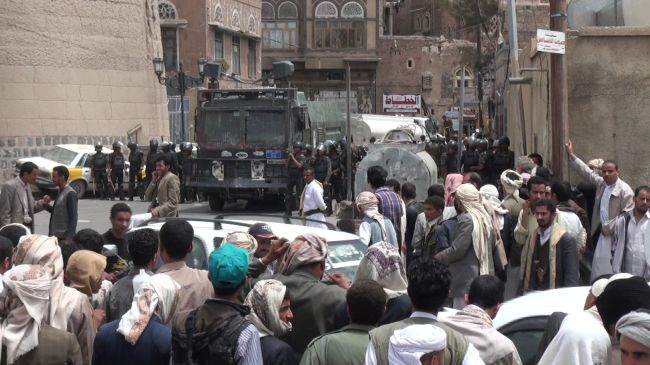1000s of Houthis protest killings of Shias


Thousands of Houthis have once again taken to the streets in the Yemeni capital Sana’a to condemn the recent killings of several Shia protesters by government forces.
On Thursday, the demonstrators chanted slogans condemning the country’s internal security service, the National Security Bureau (NSB), and called for the suspension of its activities.
“The nation wants the dismantling of the National Security Bureau!” they shouted.
The demonstrators also called on the country’s authorities to prosecute those responsible for the murder of Houthi protesters.
In addition, the protesters demanded the release of the Houthis being held by the authorities.
On June 9, Yemeni forces killed 13 Shia Houthi protesters and wounded 100 others during a demonstration outside the headquarters of the NSB — accused of human rights abuses during crackdown on the Houthis between 2004 to 2010.
The Houthis were demanding the disbanding of the NSB because of its involvement in suppression of political activists under ousted dictator Ali Abdullah Saleh.
Human Rights Watch has demanded an investigation into the killings.
Yemen’s Zaidi population, also known as Houthis, have long been protesting about oppression and discrimination by Yemen’s Saudi-backed government.
Yemen’s Shia Houthi movement draws its name from the tribe of its founding leader Hussein Badreddin al-Houthi.
The conflict between the government of Saleh and Houthi fighters in northern Yemen began in 2004 and ended when a truce was reached in 2010.
In August 2009, the Saleh government launched Operation Scorched Earth to uproot the Houthi resistance fighters, whom Sana’a had accused of seeking a return to the Zaydi imamate overthrown in a 1962 coup.
In November 2009, Saudi forces also started fighting against the Houthis and bombing their positions after accusing the fighters of killing Saudi border guards.
The Houthis, who control parts of the north and are engaged in reconciliation talks with Sana’a, accuse the government of violating their civil rights and marginalizing them politically, economically, and religiously.
Saleh, who ruled Yemen for 33 years, stepped down in February 2012 under a US-backed power transfer deal in return for immunity, after a year of mass street demonstrations demanding his ouster.
His vice president, Abdrabuh Mansur Hadi, replaced him on February 25, 2012 following a single-candidate presidential election backed by the United States and Saudi Arabia.
The Houthi movement played a key role in the popular revolution that forced Saleh to step down.







